Gender and Inclusion
Gender, age, abilities and other individual or context-specific characteristics present different opportunities and challenges to provide CVA to people in crisis in a dignified manner.
Among humanitarian actors, there is an increasing acknowledgement of the specific needs and constraints of people of differing abilities, older people, people of different genders, particularly women, and people on the move. Alongside this is a growing appreciation of the need for tailored and sensitive measures that ensure their effective inclusion.
Supporting the needs of diverse people with CVA goes beyond making them a target group; it is about meaningful engagement, purposive design and implementation, and programme adjustment to meet different groups’ needs with dignity. Inclusive approaches go hand in hand with people-centred aid.
Current priorities
The CALP Network will continue to encourage cash actors to widen their focus to be more inclusive and champion a fuller understanding of how CVA can go beyond the notion of ‘do no harm’ towards appropriately addressing the needs of diverse people in safe and dignified manners.
We will work to elevate the experiences and initiatives on CVA and gender, disability inclusive CVA, working with different ethnicities and cultural identities, minority groups, people with diverse sexual identities, and age groups.
CALP will also strive to make its work as accessible as possible.
Featured content

Collected Papers on Gender and Cash Transfer Programmes in Humanitarian Contexts
Report
Existing gender inequalities mean that disasters and conflicts impact women, men, girls and boys differently. Cash based assistance is one of the most significant developments in humanitarian assistance in recent years. But the relationship between gender and cash based assistance in humanitarian contexts is poorly understood. All too often, interventions are designed based on assumptions...

Microlearning video: CVA and Gender
Blog Post
This video provides an overview of the relationship between gender and cash and voucher assistance (CVA) structured around the humanitarian project cycle, which include: Assessment and response analysis: How to adjust the assessment processes to achieve a more accurate reflection of gender and markets. Design and implementation: How to use methods and protocols to reduce the potential...

Better Gender Outcomes in Food Assistance through Complementary and Multi-Modal Programing: Promising Practices Tip Sheet
Guidelines and Tools
This Tip Sheet is excerpted from the research report, “Better Gender Outcomes in Food Assistance through Complementary and Multi-Modal programming,” and gives promising practices by the cycles of project cycle management, as well as at the response level. Additionally, there are expert tips and wisdom practices that support the use of a gendered approach in development or humanitarian...

Cash & Voucher Assistance and Gender-Based Violence Compendium
Guidelines and Tools
The Compendium is intended as a companion to the 2015 Inter-Agency Standing Committee (IASC) Guidelines for Integrating Gender-Based Violence Interventions in Humanitarian Action and its companion resource, the GBV Pocket Guide. The guidance was developed through the efforts of 15 organizations who contributed expertise in the inception, design and review of the document. The process was led...
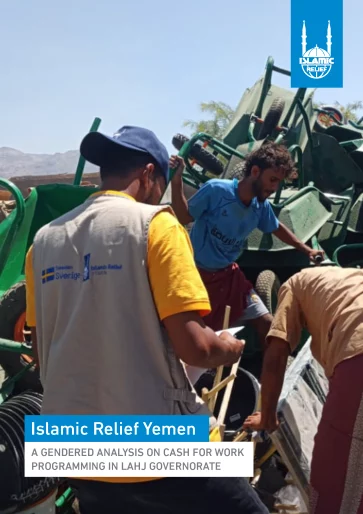
A Gendered Analysis on Cash for Work Programming in Lahj Governorate
Case Study
Cash for Work (CFW) programmes are designed to help the most vulnerable people meet their essential and basic needs. In Yemen, CFW interventions are responding to an ever-growing proportion of the Yemeni population that are in need of humanitarian assistance. Working with communities in the targeted areas of Hudayda and Lahj, the Swedish International Development Cooperation Agency SIDA-funded...
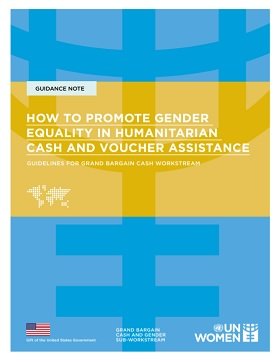
How to Promote Gender Equality in Humanitarian Cash and Voucher Assistance
Guidelines and Tools
The use of cash and voucher assistance (CVA) in humanitarian action is increasing rapidly.
With this rise, there is also growing demand by stakeholders to ensure CVA is more gender-responsive, addressing gender gaps and moving towards greater gender equality.
Gender-responsive CVA, which recognizes existing disparities and addresses the needs of all crisis-affected people equally, has the...
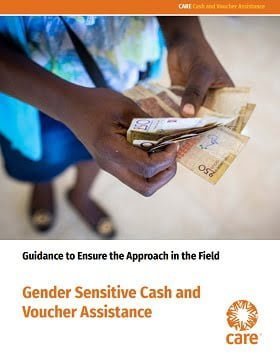
Gender-Sensitive Cash and Voucher Assistance: Guidance to ensure the approach in the field
Guidelines and Tools
This guidance builds on CARE’s ambition-via practice, research, evidence on CVA–and aims to support the application of gender sensitive CVA throughout the project cycle and at the response level. It is divided into two sections: – Part A: ‘What has been learned about gender sensitive CVA?,’ briefly explains the recommendations that came from the research. – Part B: ‘How do we...

Enablers and Gaps: Gender Equality, Gender-Based Violence Response and Mitigation in Cash and Voucher Assistance at Response levels: analysis on three case studies
Report
The Gender and Cash Sub-Workstream identified three case studies that illustrate how Cash Working Groups, GBV Sub-Clusters, gender focal points (e.g. Gender in Humanitarian Action Working groups at country and regional level) and humanitarian partnerships can enable meaningful and wider engagement on gender equity and GBV response in CVA. The case studies all show different aspects of linking...

How to mitigate gender-based violence (GBV) risks in cash and voucher assistance (CVA)
Video
Cash and voucher assistance (CVA) is an important tool to help individuals affected by crises get back on their feet. But just like any other form of assistance, it is vital to ensure that it does not fuel tensions in the household or in the community and that it does not create new risks for women and girls. Fortunately, there are a variety of ways that cash actors can work to mitigate risks...

Inclusive Information Systems for Social Protection: Intentionally Integrating Gender and Disability
Policy paper
Digital information systems serving the social protection sector, and especially social assistance, are increasingly prominent and will continue to be, as is the case within all other sectors. “Why? Because the ability of a country to care for its people and respond to their lifecycle needs depends on its ability to identify those who are in need, enroll them, provide tailored benefits and...
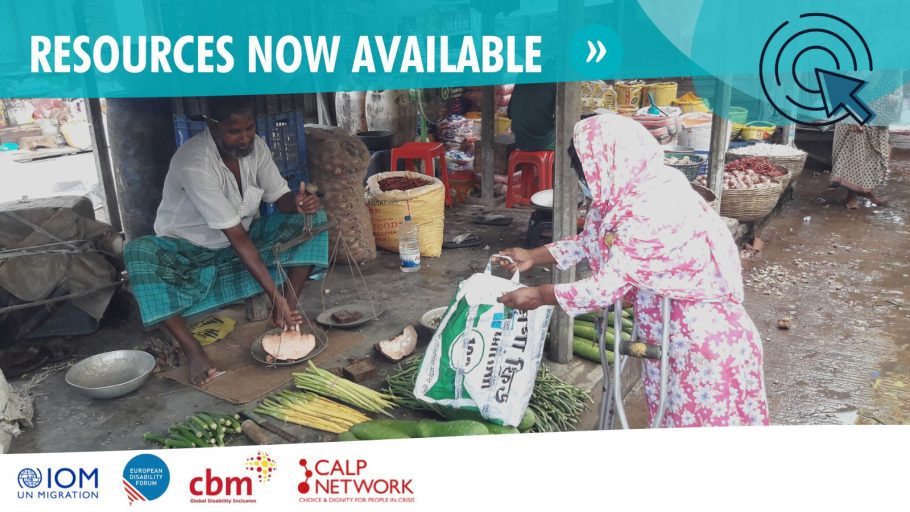
Mainstreaming disability inclusion into humanitarian CVA
Presentation
What is a rights-based approach to disability? How can disability inclusion be mainstreamed to ensure more inclusive and effective CVA humanitarian responses? To answer these key questions, CALP, CBM Global, European Disability Forum and International Organization for Migration (IOM), came together to organize the webinar “Mainstreaming disability inclusion into humanitarian CVA”, with the...
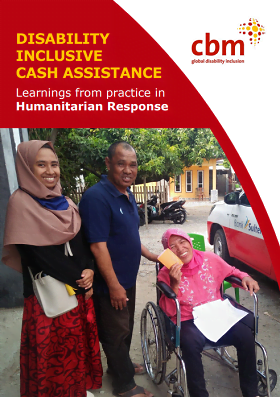
Disability Inclusive Cash Assistance: Learnings from Practice in Humanitarian Response
Guidelines and Tools
This case study collection describes lessons learned from seven inclusive humanitarian cash transfer projects implemented from 2015 – 2020 in Niger, Zimbabwe, Pakistan, Bangladesh, Philippines, and Indonesia, and five ongoing projects from the 2020 Covid-19 pandemic responses. This good practice collection aims to benefit both humanitarian practitioners engaged in Cash Based Interventions...
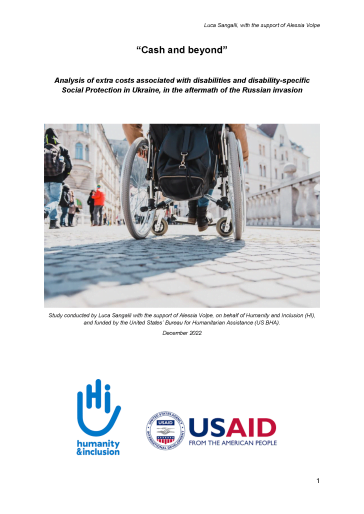
Cash and beyond – Analysis of extra costs associated with disabilities and disability-specific social protection in Ukraine, in the aftermath of the Russian invasion
Report
Following the escalation of the conflict in Ukraine in February 2022 and the consequent humanitarian crisis, the country has experienced active fighting and massive displacement, both within and outside its borders. Persons with disabilities and older persons have been facing particularly harsh effects, especially for those with more severe forms of disabilities, who encountered challenges in...
Thematic lead
Latest

A Review of Evidence of Humanitarian Cash Transfer Programming in Urban Areas: Annexes
Report
Annexes to accompany the working paper ‘A review of evidence
of humanitarian cash transfer programming in urban areas”

Guide for Protection in Cash based Interventions
Guidelines and Tools
This guide identifies minimum necessary information and key resources needed to help humanitarian practitioners ensure that protection risks and benefits are considered and monitored throughout the cash-based interventions (CBI) program cycle, using a community-based approach and participatory methods as...

Feasibility of cash transfer modalities in refugee settlements
Report
The main objective of this market assessment was to determine market functionality and the feasibility of cash transfer modality (and use of mobile money) among refugee settlements (Kyangwali, Kyaka II, Rwamwanja and Koboko) proposed for the cash transfer scale up in 2016. Survey households were randomly...

Integrating Gender throughout a Project’s Life cycle 2.0: A Guidance Document for International Development Organisations and Practitioners
Guidelines and Tools
The overarching premise of this document is that to conduct effective, responsible development work, incorporating gender at all stages of a project’s life cycle – from project design and proposal development to field implementation and monitoring, evaluation and learning – is critical. As such,...

Tips for Protection in Cash based interventions
Guidelines and Tools
This document presents a set of general tips to identify, monitor and mitigate protection risks and maximize protection benefits of cash-based interventions.

A Double-edged Sword: Livelihoods in emergencies guidance and tools for improved programming
Guidelines and Tools
This document aims to help economic development practitioners who design economic strengthening projects with the particular aim of improving child wellbeing and for others whose aim is poverty alleviation more broadly. The guidance presented is based on the understanding that: 1. Household economic...
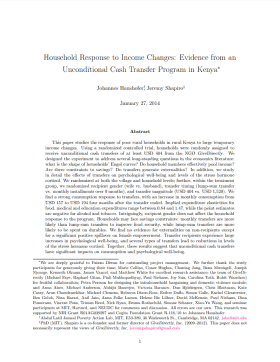
Household Response to Income Changes: Evidence from an unconditional cash transfer program in Kenya
Report
This paper studies the response of poor rural households in rural Kenya to large temporary income changes. Using a randomized controlled trial, households were randomly assigned to receive unconditional cash transfers of at least USD 404 from the NGO GiveDirectly. We designed the experiment to address...

Cash Transfers and HIV Prevention
Report
This paper proposes some initial principles on how to optimize HIV impacts of cash transfers, by encouraging targeting that: focuses on communities with high rates of new HIV infections, particularly acquired via sexual transmission; reduces local or community levels of economic inequalities between men...
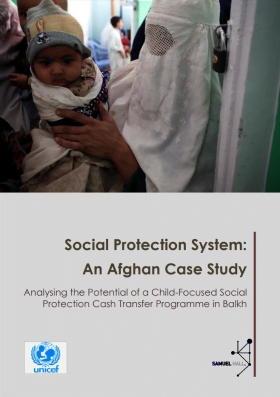
Social Protection System: An Afghan case study, analysing the potential of a child-focused social protection Cash Transfer Programme in Balkh
Report
UNICEF is considering the development of a social protection programme with a specific focus on children, within the already existing framework developed by the World Bank and MoLSAMD. With the end goal of articulating children-sensitive programming with the World Bank’s own safety net programme in...
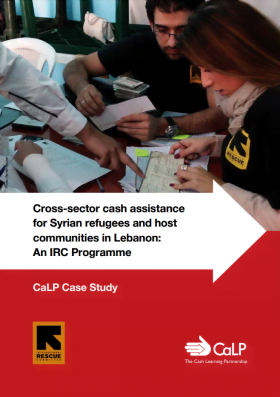
Cross-Sector Cash Assistance for Syrian Refugees and Host Communities in Lebanon: An IRC Programme
Report
Since January 2013, the International Rescue Committee (IRC) has been implementing a project providing humanitarian assistance to the Syrian refugees in Lebanon. This project provided unconditional financial assistance to targeted Syrian refugees and Lebanese host households to help them be better...
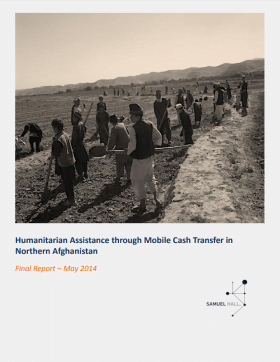
Humanitarian Assistance through Mobile Cash Transfer in Northern Afghanistan: An evaluation of a DFID pilot project in Faryab, Jawzjan, and Samangan
Report
In response to the 2011 severe drought that pushed vulnerable rural households into food insecurity in 14 provinces of Northern Afghanistan, DFID has committed to address emergency needs in northern Afghanistan with nutrition, food security and farming inputs. Samuel Hall Consulting, a Kabul-based...
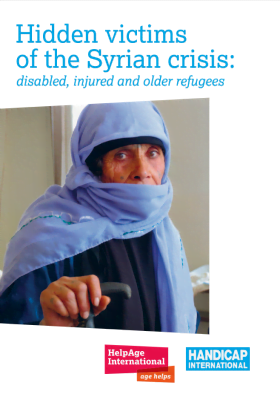
Hidden Victims of the Syrian Crisis: Disabled, injured and older refugees
Report
The Syrian crisis has generated the largest refugee movement since the Rwandan genocide and is described as the defining refugee crisis of our era. According to the United Nations High Commissioner for Refugees, Antonio Guterres, Syrian refugees are about to replace Afghans as the world’s largest...

Understanding the Interaction Between Women’s Economic Empowerment and Gender Based Violence: Study on ACF’s cash transfer programme in northern Uganda
Report
This paper presents findings of a qualitative study conducted in Northern Uganda, on the effects of a cash transfer programme on gender relations and GBV in a post – conflict context. The intervention in focus is Action Against Hunger |ACF International (ACF)’s ‘Combating Gender Based Violence and...

Cash-Based Assistance Programmes for Internally Displaced Persons in the Kabul Informal Settlements
Report
To improve aid delivery and effectiveness, Welthungerhilfe (WHH) piloted during the 2013/2014 winter a mobile-based cash assistance programme aimed at supporting IDP families living in the Kabul informal settlements (KIS) using Roshan’s M-PAISA service. To assess the strengths and...

Social Transfer Programme in Nepal: An overview
Presentation
A overview of the social transfer programme in Nepal.

Sector Indicator Guidance for Programming
Guidelines and Tools
The country Programming Instructions that were sent to EU Delegations and HQ services in mid-May 2012 for the programming period 2014-2020, requested the EU Delegations and services to provide, in the second phase of the programming process, a description of specific objectives for proposed priority...

Women’s Empowerment and Nutrition
Report
Research on the relationship between women’s empowerment and nutrition, particularly child nutrition, is continually expanding. As part of the quest to achieve gender equality, women’s empowerment has
increasingly been the focus of many development interventions. In addition to being an end goal in...

Building Women’s Economic and Social Empowerment Through Enterprise: An experimental assessment of the Women’s Income Generating Support (WINGS) program in Uganda
Report
Investing in women is said to be a key to development. Educate her, buy her a cow or goat, or help her start a business and great things will follow: sustained increases in income, greater empowerment and social inclusion, health and education for the children, and (especially in war-affected regions)...
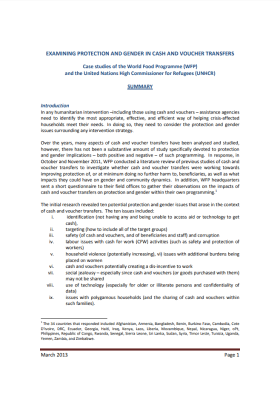
Examining Protection and Gender in Cash and Voucher Transfers – Summary
Report
In any humanitarian intervention – including those using cash and vouchers – assistance agencies need to identify the most appropriate, effective, and efficient way of helping crisis-affected households meet their needs. In doing so, they need to consider the protection and gender issues surrounding...

The Effect of Cash, Vouchers and Food Transfers on Intimate Partner Violence: Evidence from a randomized experiment in Northern Ecuador
Report
Despite the pervasive and far reaching consequences of intimate partner violence (IPV), there is little conclusive evidence on policy instruments to reduce or prevent violence. Using a randomized experiment in Northern Ecuador, this study provides evidence on whether cash, vouchers and food transfers...



